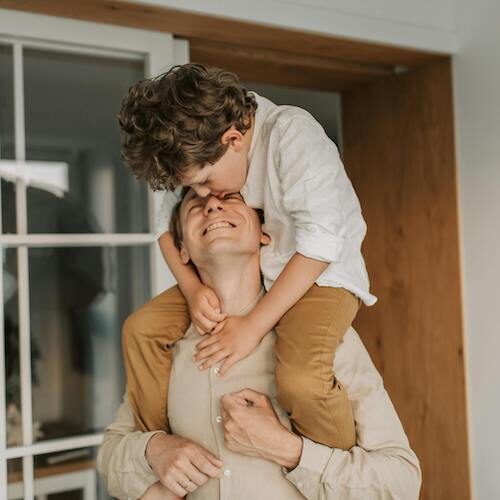Father’s Day, like Mother’s Day, can be a difficult and sensitive holiday for many, especially if Dad is disconnected from his family.
Since I’m not a father, I cannot speak about what recovery is like for a father. But I can share a story about a woman who was part of one of our Live Free Wives Small Groups Online and how her husband’s recovery impacted her and their kids.
Kelsey and Thomas nearly lost their five-year marriage to his porn addiction. At her request that he seek help, he joined a Live Free Small Group. As he built relationships in a safe community, he exchanged shame for connectivity. Their marriage began to change.
Encouraged by Thomas’s growth, Kelsey also sought help and joined a small group. As they both began to heal, they committed to marriage counseling. With each of them having a Live Free community to rely on and the expertise of a good therapist, the health of their family improved.
For many women, the wounds left by addiction, emotional distance, or past trauma are deep. There may have been broken trust, unpredictability, or emotional unavailability. Recovery offers a chance for a new beginning—not just through words, but through consistent, visible action. Wives and kids, even young kids like Thomas and Kelsey’s, need to experience their dad’s changed behavior, not his empty promises in order to live in truth.
Seeing Dad choose recovery is powerful. It means he’s choosing to be present. He’s choosing responsibility. Perhaps most importantly, he’s choosing to change the legacy he leaves.
Children thrive on consistency. When Dad heals, his ability to show up—not just physically, but emotionally and mentally—becomes one of the most valuable gifts he gives his family. From a wife’s perspective, it’s about seeing him become someone she and the children can count on, not just on good days, but every day.
When Dad learns to express love, ask for forgiveness, validate feelings, and talk openly, he teaches his children emotions are not a weakness, but a strength. This emotional engagement creates deeper intimacy, honesty, and connection.
Healing requires acknowledging the past without living in shame. When a man owns his mistakes and makes amends, he models humility and courage for his children. For a wife, this can be a turning point—seeing that he is no longer hiding behind denial or defensiveness but standing in truth and growth.
Trust is rebuilt through actions, not just words. I know I’ve said it a couple of times here, but it is an important aspect of visible and lasting recovery. A man’s words may have lost their weight after repeated disappointments. But when a father begins to show up with reliability, patience, and integrity, the entire family begins to feel safer. This restoration of trust doesn’t happen overnight, but it can be achieved with consistent choices to change.
Addiction, avoidance, or unchecked emotional pain often pull dads away from their families. Recovery teaches them how to lean into discomfort, rather than run from it. Being part of a Live Free community offers a safe place to lean. When a father learns to stay present during hard moments—tantrums, teen arguments, financial stress, marital pressure—it shows his wife and children that love means staying, not escaping.
Thomas and Kelsey’s healing reflected what mutual love and reliable partnership can look like. Children who see parents navigating recovery together learn real relationships take work, vulnerability, forgiveness, and mutual effort.
Recovery is not just about a husband stopping harmful behaviors—it’s about him becoming the man and father he is capable of being. It’s about his wife and kids watching him turn pain into purpose and becoming a man of strength, compassion, and love. When a dad heals, the whole family heals.


